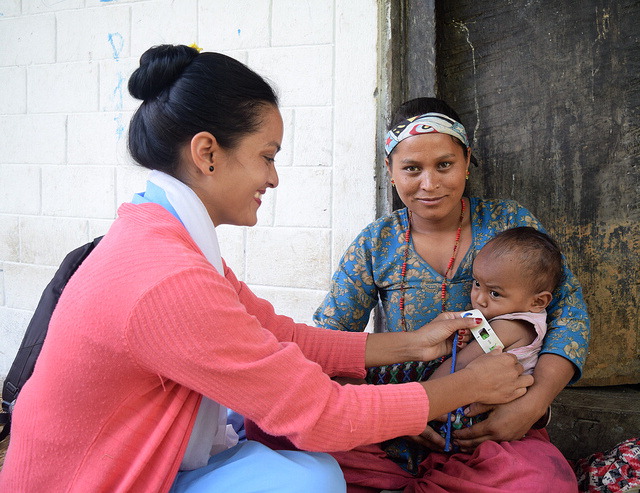|
Cycle 5 (2015 Deadline)
Cluster-controlled implementation science trial of integrated maternal newborn child healthcare delivery in group settings
PI: Pushpa Chaudhary (deopushpa@gmail.com), Nepal Ministry of Health & Possible (formerly known as Nyaya Health)
U.S. Partner: Duncan Maru, Brigham and Women's Hospital
Project Dates: January 2017 - December 2020
Project Overview
 | | A community health worker conducts a check-up (photo courtesy of Dr. Chaudhary). |
This research team conducted a cluster-controlled, stepped wedge implementation science trial of a bundled maternal healthcare delivery intervention in rural communities in Nepal. Nepal represents an ideal setting to pilot this study based on its robust national community health worker network, progressive national healthcare priorities, and the team's personal experience in delivering healthcare in a district public healthcare setting since 2008. The intervention integrated three evidence-based approaches for maternal, newborn, and child health: (1) group antenatal and postnatal care to improve the institutional birth rate and reduce mortality among children under age two; (2) a Community Health Worker (CHW) model of home-based care to monitor and increase utilization of services, maternal and neonatal health knowledge, self-efficacy, social support, and emergency planning among mothers; and (3) a mentoring approach to quality improvement targeted at government clinic providers in the study population. This intervention was implemented and tested in the district of Achham, Far-West Nepal, within a district population of 260,000.
The study aimed to analyze the impact of the integrated care package on institutional birth rates and under-two mortality using community household survey data. The researchers assessed the mechanisms of the impact of group integrated care and assessed the efficacy of targeted CHW protocols for a home-based model of care delivery to address maternal, neonatal, and child care, in addition to chronic disease care, continuous surveillance, and mortality assessment. They described key aspects of the implementation process, including costs, human resources, logistics, and fidelity of the group integrated care program to model content and processes. Finally, they produced a cost-effectivness analysis to determine affordability for national government adoption and Possible’s care delivery model.
Final Summary of Project Activities
The primary outcome of this CHW intervention providing comprehensive sexual, reproductive, maternal, newborn and child health services was an increase in the institutional birth rate. With the support of PEER, the project team was able to complete the project including enrollment of 11,416 births in the study, enrolling 55,419 households through an integrated community health worker program. For the primary outcome, the team observed an average increase from 65% in institutional birth rate at the start of the intervention to 84% at year 1, 93% at year 2, 97% at year 3, and 98% at year 4 following the intervention. This result is significant (p<0.05) for the impact of the intervention. The team plans to use these publications along with dissemination efforts to advocate for a professional cadre of CHWs delivering integrated services throughout Nepal.
In December 2020, the Kathmandu University Dhulikhel Hospital (KU) adopted the Dolakha Community Health Program. The university, through its hospital based in Dolakha, built upon the existing CHW program to establish and scale an integrated hospital to home model. KU utilized the technical support of Possible to facilitate the adoption of the program and the continuation of health services to these remote populations in the Dolakha district.
Publications
Wan-Ju Wu, Aparna Tiwari, Nandini Choudhury, Indira Basnett, Rita Bhatt, David Citrin, Scott Halliday, Lal Kunwa, Duncan Maru, Isha Nirola, Sachit Pandey, Hari Jung Rayamazi, Sabitri Sapkota, Sita Saud, Aradhana Thapa, Alisa Goldberg, and Sheela Maru. 2020. Community-based postpartum contraceptive counselling in rural Nepal: a mixed-methods evaluation. Sexual and Reproductive Health Matters 28:2, 1765646. https://doi.org/10.1080/26410397.2020.1765646
P. Nepal, R. Schwarz, D. Citrin, et al. 2020. Costing analysis of a pilot community health worker program in rural Nepal. Glob Health Sci Pract 8(2):239-255. https://doi.org/10.9745/GHSP-D-19-00393
D. Citrin, P. Thapa, I. Nirola, et al. 2018. Developing and deploying a community healthcare worker-driven, digitally enabled integrated care system for municipalities in rural Nepal. Healthcare 6: 197-204. https://doi.org/10.1016/j.hjdsi.2018.05.002
S. Maru, I. Nirola, A. Thapa, et al. 2018. An integrated community health worker intervention in rural Nepal: a type 2 hybrid effectiveness-implementation study protocol. Implementation Science 13:53. https://doi.org/10.1186/s13012-018-0741-x
D. Maru, S. Maru, I. Nirola, et al. 2017. Accountable care reforms improve women’s and children’s health in Nepal. Health Aff (Millwood) 36(11): 1965–1972. https://doi.org/10.1377/hlthaff.2017.0579
Back to PEER Cycle 5 Grant Recipients
|
|
|
|




